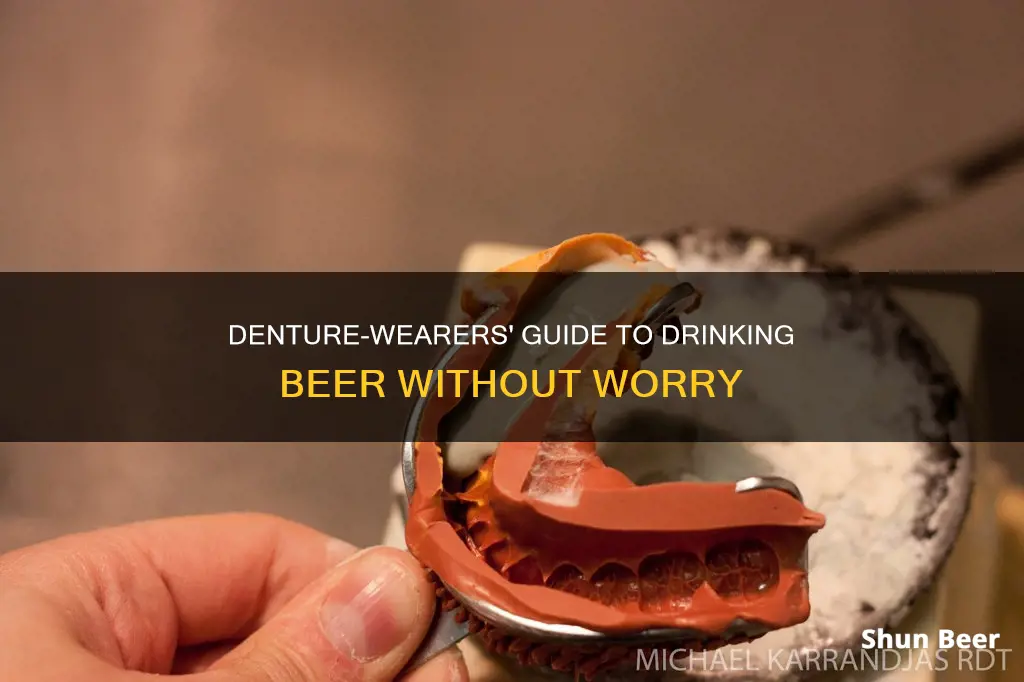
Drinking alcohol with dentures is unlikely to damage them, but there are other reasons why you might consider limiting your alcohol consumption. Ethanol, the type of alcohol found in drinks, is less harmful to dentures than isopropyl alcohol, which is used to clean them. However, alcohol can cause denture pain in the lower gums, especially for those with significant bone loss. Dentures can also affect the way alcohol is retained in the mouth, which may impact breath alcohol concentration (BrAC). Additionally, hot drinks can loosen denture fixatives, so it's important to be cautious when consuming hot beverages with dentures.
What You'll Learn

Dentures and alcohol consumption
If you have dentures, you may be wondering if you can continue to enjoy a drink without causing damage to your dentures or experiencing other adverse effects. Here's what you need to know about drinking alcohol with dentures:
The base material used for modern dentures, polymethylmethacrylate (PMMA), is not water-soluble but is soluble in alcohol. However, the type of alcohol typically found in alcoholic beverages (ethanol) is less harmful to PMMA than isopropyl alcohol, which is used in some cleaning solutions. While ethanol may not cause your dentures to dissolve, prolonged exposure to alcoholic beverages can lead to tiny cracks (crazing) that weaken the structure of your dentures over time. Therefore, while an occasional beer or alcoholic drink is unlikely to cause immediate damage, excessive or frequent consumption may increase the risk of fracture.
Adjusting to Eating and Drinking with Dentures:
When you first get your dentures, there will be an adjustment period where eating and drinking may be challenging. Here are some tips to help you during this transition:
- Start with soft foods and small bites: Initially, stick to softer foods that are easy to chew. Cut your food into small, bite-size pieces to make it easier to manage.
- Chew carefully and evenly: Be mindful of how you chew. Chew slowly and evenly on both sides of the mouth to avoid putting uneven pressure on your dentures. Use your back teeth to keep the dentures in the correct position and prevent tipping or loss of suction.
- Avoid hot beverages and foods: Dentures insulate the mouth, making it difficult to judge the temperature of what you're consuming. Avoid hot beverages and foods until you are used to your dentures to prevent burns.
- Swallow quickly: Holding liquids in your mouth for too long can loosen or shift your dentures. It's best to swallow quickly, especially when drinking.
- Avoid certain foods and drinks: Coffee can stain your dentures, and gum should be avoided due to its stickiness. Nuts, seeds, and foods with bones or shells can get stuck under your dentures or break them, so it's best to refrain from consuming these.
- Practice good denture hygiene: Keep your dentures clean by removing them daily, brushing them thoroughly, and soaking them overnight in a recommended cleaning solution. This prevents bacteria buildup and keeps your dentures in good condition.
Other Considerations:
In addition to the potential for structural damage to your dentures, excessive alcohol consumption can lead to other negative effects for denture wearers. Some people with dentures report experiencing significant denture pain in their lower gums associated with alcohol consumption, especially with significant bone loss. Therefore, it is advisable to monitor your alcohol intake and practice moderation to avoid discomfort and maintain the integrity of your dentures.
Beer and Kidney Disease: What's the Connection?
You may want to see also

Eating and drinking with dentures
Adjustment Period
When you first get dentures, there is an adjustment period where eating and drinking can be challenging. Your palate, jaw, and tongue need to adjust to the dentures, and this takes time. You will need to be patient with yourself as you get used to the new sensations and feelings.
Chewing
Chewing with dentures will require some practice. Initially, you should stick to soft foods that are easy to chew, such as scrambled eggs, fully cooked pasta, smoothies, soups, and chilli. Cut your food into small, bite-sized pieces, and avoid biting with your front teeth; use your canines instead. Chew slowly and evenly on both sides of your mouth to avoid putting uneven pressure on your dentures and to prevent sore spots. Be cautious when eating harder foods, and avoid anything with bones or shells that could break your dentures. Also, refrain from chewing gum or eating sticky, hard, or sharp-edged foods, as these can damage or dislodge your dentures.
Drinking
It is important to be cautious with hot drinks and foods, as dentures insulate the mouth, making it difficult to judge the temperature. This can lead to burns. Additionally, hot beverages and soups can loosen denture fixatives, so take extra care. Avoid drinking anything that is excessively cold, as this can also be uncomfortable. Coffee and tea can also stain your dentures.
Taste
Your sense of taste may be affected by your dentures, as your palate is partially covered by the upper denture. However, your taste buds will adjust over time, and you will be able to enjoy your favourite dishes as before.
Cleaning
To keep your dentures in good condition and prevent bacteria and infections, it is essential to clean them daily. Remove your dentures and brush them thoroughly, just as you would natural teeth. Soak them overnight in a cleaning solution to keep them fresh and prevent them from drying out.
Alcohol
While alcohol is unlikely to damage your dentures, excessive consumption may lead to other issues. There have been reports of people experiencing denture pain in their lower gums after drinking alcohol, particularly those with significant bone loss. Additionally, alcohol can cause tiny cracks in the base material of dentures, leading to potential structural weakness. Therefore, it is advisable to limit your alcohol intake while wearing dentures.
Beer Drinking and Slim Trimming: Is It Possible?
You may want to see also

Denture maintenance
- Cleaning your dentures: Remove your dentures daily and brush them thoroughly, just as you would your natural teeth. Soak them overnight in a cleaning solution to keep them fresh and clean and prevent them from drying out, which can damage them.
- Eating and drinking with dentures: When you first get your dentures, start with soft foods and cut your food into small, bite-sized pieces that are easy to chew. Chew slowly and carefully to avoid dislodging your dentures or catching the inside of your cheek. Be cautious when consuming hot foods and beverages as dentures insulate the mouth, making it difficult to judge temperature and potentially causing burns. Avoid anything with bones or shells, as well as nuts and seeds, as these can get stuck under the denture and cause discomfort. Also, be mindful of the type of liquids you drink, as some can affect your dentures.
- Chewing with dentures: Chew with the back teeth, using both sides of the mouth at the same time, to keep the dentures in the correct position and prevent them from tipping or losing suction. Avoid chewing directly with the front teeth as this can cause damage and gum irritation.
- Rinsing dentures: After drinking anything other than water or eating any food, remove your dentures and gently rinse them with water to prevent food and sugary liquids from becoming trapped and causing infections.
- Temperature caution: Dentures can affect your ability to judge the temperature of food and drinks, so be cautious to avoid brain freeze or burning your tongue. Take small bites or touch the food with your fingertip before consuming it to test the temperature.
- Avoiding certain foods: Refrain from consuming gum, coffee, and extremely hot or cold drinks as they can stick to your dentures, stain them, or loosen the fixatives.
Understanding Beer Staffs: A Guide to Their Functionality
You may want to see also

Denture pain
Dentures are designed to replace missing teeth and help people chew food properly. However, there is an adjustment period when getting used to eating and drinking with dentures. During this time, it is recommended to consume softer foods and liquids that are less likely to cause discomfort or damage to the dentures.
It is common to experience some soreness and unusual sensations when adjusting to new dentures. This is due to the mouth muscles and taste buds getting accustomed to the new fixture. Some people may also experience a change in taste and sensitivity to hot and cold drinks. In addition, new dentures can cause wearers to misjudge the temperature of hot drinks, which can result in burns.
When drinking with new dentures, it is important to be cautious about the temperature of the liquid to avoid brain freeze or burning the tongue. Hot beverages and soups can also loosen denture fixatives, so extra care is needed. It is recommended to test temperatures by taking small sips or touching the liquid with a fingertip before drinking.
Some beverages should be avoided or consumed with caution during the adjustment period to prevent discomfort and possible damage to the dentures. These include:
- Carbonated drinks: The carbonation can cause irritation and bleeding in those with new dentures, as it interferes with the healing process of the gum tissue.
- Acidic juices: Orange, tomato, grape, and apple juices are highly acidic and can irritate healing gums.
- Strong spirits: While it may not be visible, alcohol can cause structural problems and cracks in dentures over time, especially stronger spirits. This can affect the fit of the dentures and cause gum irritation.
In addition, it is important to note that dentures should not be soaked in mouthwash containing alcohol or cleaned with isopropyl alcohol, as this can cause cracks and weaken the structure.
While drinking beer is generally not advised during the initial adjustment period, it is unlikely to damage dentures. However, people with dentures may experience denture pain in their lower gums after consuming alcohol. This is more common among individuals with significant bone loss, and the only solution is to reduce alcohol consumption.
To manage denture pain, it is recommended to:
- Start with soft foods: Opt for softer foods that are easy to chew and cut them into small, bite-sized pieces.
- Chew carefully: Chew slowly and with the back teeth to keep the dentures in the correct position and avoid dislodging them.
- Avoid hard and sticky foods: Refrain from consuming anything with bones or shells that could break the denture, as well as sticky foods like gum that can cause dislodging and soreness.
- Practice good denture hygiene: Remove, rinse, and brush dentures regularly to prevent food and sugary liquids from becoming trapped, leading to infections.
- Consult a dentist: If denture pain persists or becomes unbearable, seek professional advice from a dentist.
Beer and Blood Work: What's the Connection?
You may want to see also

Denture adhesives
Choosing the Right Adhesive
Research suggests that you may not need a denture adhesive if your dentures are properly fitted. However, it is quite common to require an adhesive if you've had your dentures for a long time, as your jaw will naturally change shape over the years. Denture adhesive usually comes in two forms: paste and powder. It is recommended to choose a zinc-free adhesive, as overuse of zinc can lead to potential health issues.
Applying the Adhesive
Before applying the adhesive, ensure your dentures are clean and dry. This will help the adhesive stick to your dentures and gums. Apply 3-4 small dabs of adhesive, spaced evenly apart, to the inside surface of your upper denture. Avoid applying the adhesive too close to the edge of the denture. Repeat this process for your lower denture. Place the dentures into your mouth and press them together firmly to secure them in place.
Using Powder Adhesive
If you opt for a powder adhesive, ensure your dentures are moist, as this will help the powder stick to your dentures. Sprinkle the powder evenly over the surface of your dentures, distributing it in an even layer. Gently shake or vibrate your dentures to ensure the powder covers all areas. Place your dentures into your mouth, using your thumb and forefinger to press them into place.
Removing Dentures and Adhesive
It is important to remove your dentures at night before bed. To do this, first, rinse your mouth with warm water or mouthwash to remove any food debris. Next, gently rock your lower denture back and forth to slowly release it from your gums. Removing the upper denture can be more challenging due to its larger surface area. Use your thumb to press against the front teeth, pushing upward and outward towards your nose to dislodge the denture. Alternatively, use your index fingers to go as deep as possible on the lateral sides and pull the denture down vertically.
Additional Tips
- Always follow the instructions on the adhesive label.
- Avoid using too much adhesive.
- Clean any adhesive residue from your dentures and mouth at the end of the day.
- Soak your dentures overnight in a cleaning solution to keep them fresh and prevent them from drying out.
Drinking Beer in Public: Michigan's Law Simplified
You may want to see also
Frequently asked questions
Yes, you can drink beer with dentures, but there are a few things to keep in mind. Firstly, avoid using mouthwash containing alcohol or isopropyl alcohol to clean your dentures as it may cause tiny cracks that lead to structural weakness. Additionally, be cautious of the temperature of the beer as dentures insulate the mouth, making it difficult to judge the temperature and potentially leading to burns. It is also important to swallow quickly when drinking beer with dentures as holding liquids in the mouth for too long can loosen or shift the dentures.
It is recommended to avoid hot beverages and foods when adjusting to life with dentures as it can be difficult to judge the temperature, which may result in burns. Coffee and tea should be consumed with caution as they can also stain dentures.
Yes, it is important to note that holding liquids in the mouth for too long can loosen or shift the bottom dentures. Therefore, it is recommended to swallow quickly, especially when drinking beverages that are not room temperature.
One of the challenges of drinking with dentures is that it can be difficult to judge the temperature of liquids, which may result in brain freeze or burnt tongues. Additionally, dentures can loosen over time, especially when exposed to hot liquids, so it is important to be cautious and practice proper denture care and maintenance.
When adjusting to drinking with dentures, it is recommended to start with room temperature or cooler beverages to avoid burns and to swallow quickly to prevent loosening or shifting of the dentures. Practicing proper denture maintenance, including regular cleaning and soaking in a non-alcoholic solution, will also help ensure a more comfortable drinking experience.







